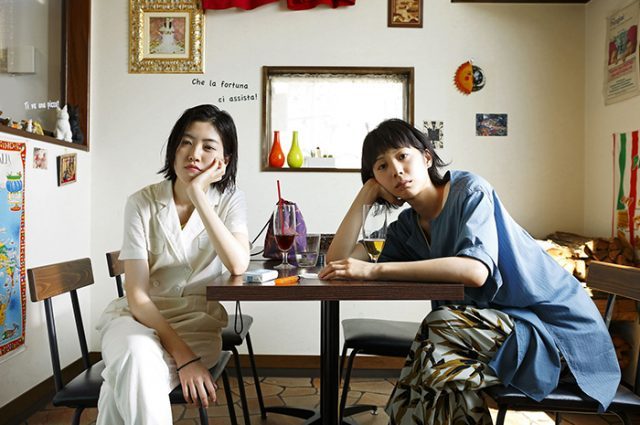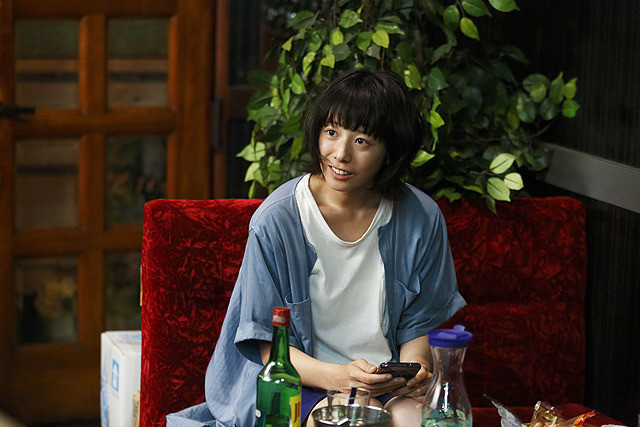
Kiyoura (Shim Eun-Kyung) and Sunada (Kaho) wonder what’s next in Yuko Hakota’s Blue Hour
FESTIVAL OF NEW JAPANESE FILM: BLUE HOUR (BURU AWA NI BUTTOBASU) (ブルーアワーにぶっ飛ばす) (Yuko Hakota, 2019)
Japan Society
333 East 47th St. at First Ave.
Sunday, July 28, 8:00
Festival runs July 19-28
212-715-1258
www.japansociety.org
 The Japan Cuts festival at Japan Society concludes July 28 with the North American premiere of Yuko Hakota’s beautiful, wistful Blue Hour. The movie is named after one of the two magic times of day, particularly for filmmakers: The golden hour occurs right after sunrise and before sunset, when the sky turns a warm, golden color, while the blue hour takes place right before sunrise and after sunset, when a colder, deep blue permeates. In the film, Kaho stars as Sunada, a television commercial director with a habit of making poor decisions in her life and career. She’s just turned thirty and wants to do more than produce ads but does not appear to be driven enough. She is married to a kindhearted man-child (Daichi Watanabe) but is having an affair with the married Togashi (Yusuke Santamaria). At a party, she drinks to excess, embarrassing herself in front of her crew. And she hasn’t been home to visit her family in several years. She seemingly could have it all, but she lacks ambition and often seems chilly and aloof to others. “I don’t like people who like me,” she says at one point. Later, she admits, “I don’t know what it’s like to be close.”
The Japan Cuts festival at Japan Society concludes July 28 with the North American premiere of Yuko Hakota’s beautiful, wistful Blue Hour. The movie is named after one of the two magic times of day, particularly for filmmakers: The golden hour occurs right after sunrise and before sunset, when the sky turns a warm, golden color, while the blue hour takes place right before sunrise and after sunset, when a colder, deep blue permeates. In the film, Kaho stars as Sunada, a television commercial director with a habit of making poor decisions in her life and career. She’s just turned thirty and wants to do more than produce ads but does not appear to be driven enough. She is married to a kindhearted man-child (Daichi Watanabe) but is having an affair with the married Togashi (Yusuke Santamaria). At a party, she drinks to excess, embarrassing herself in front of her crew. And she hasn’t been home to visit her family in several years. She seemingly could have it all, but she lacks ambition and often seems chilly and aloof to others. “I don’t like people who like me,” she says at one point. Later, she admits, “I don’t know what it’s like to be close.”

Sunada (Kaho) has trouble finding happiness in Blue Hour
When Sunada mentions to one of her only friends, the impulsive, unemployed, and very charming Kiyoura (Shim Eun-Kyung), that she is getting ready to go home to see her grandmother, Kiyo proclaims that she will drive them there right away, so they get into her car and away they go. We learn a lot about the two women on the road trip — although this is no Thelma and Louise — but even more when they arrive at Sunada’s family’s small farm in the boondocks, where her oddball brother, Sumio (Daisuke Kuroda), lives with their sweet mother (Kaho Minami) and eclectic father (Denden). Sunada looks like she would rather be anywhere else. As Sunada refuses to relate to her significantly un-Ozu-like clan, Kiyo fits right in, always seeking fun in whatever she does, the polar opposite of her friend.
Lovingly photographed in soft hues by Ryuto Kondo, Hakota’s debut is a moving and poignant tale of a woman who has, sadly, apparently given up too soon; she’s an unusual protagonist in that just as she says that she doesn’t like people who like her, she herself is difficult to like. It’s hard not to see her as emblematic of Japan’s current troubled younger generation, one noted for its failure to socialize, date, marry, get a job, or even leave the house. Former teen model Kaho (A Gentle Breeze in the Village, Our Little Sister) wonderfully captures the character’s ennui, while award-winning South Korean actress and former child star Shim (Happy Killers, Miss Granny) is radiant as the ever-positive Kiyo, who is in love with life no matter where it takes her. Blue Hour is a small gem, quirky and insightful, delicate and alluring. The screening will be followed by a Q&A with Hakota, Kaho, and Shim. Among the other films playing at Japan Cuts are Mitsuaki Iwago’s The Island of Cats, Hiroshi Okuyama’s Jesus, and Makoto Sasaki’s Night Cruising in addition to the free panel discussion “The Current State of Film Restoration in Japan” on July 26 at 4:30, which will examine the industry itself and the restoration of Kenji Mizoguchi’s masterpiece Ugetsu.